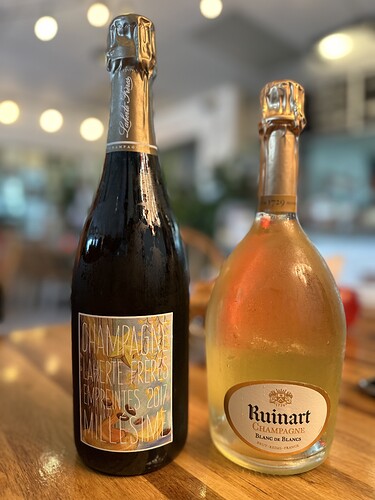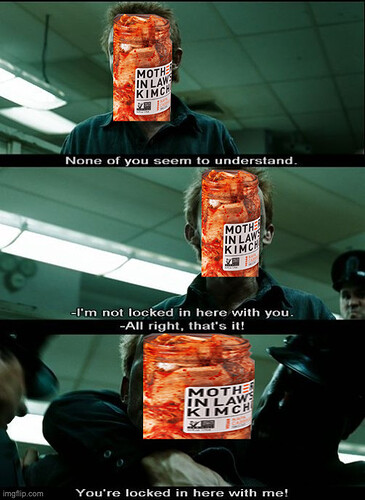This is my preferred stopper, which I like better than the two wing design as I’ve had those pop off when jostled.
Just cork it and fridge it. Or cork it and put it into your freezer if you might not drink it the next day. (I learned that the latter works from a fellow BWEer/Berserker, BTW).
Thanks for all of the suggestions. Poor planning on my part. We’ll have to make do this time, but will look into getting one of the suggested stoppers / contraptions soon.
For the sake of science, I did a side by side tasting of these two bottles with dinner tonight. They are both offered at a similar price point and I wanted to see / taste what the differences may be. The main finding of this scientific inquiry was confirmation that I really like champagne. ![]()
Silver spoon if you have no other options
So serious question: people who are putting bottles in the fridge with no closure or are freezing Champagnes and drinking them later, have you freezed 96 Salon? CdM? VVF?
Yeah. I just put these kinds of daily drinkers with the opened Pellegrinos so anyone can grab them. YOLO.
I always use cling wrap for unfinished sparkler, it preserves the bubbles very well.
This is complete superstition.
No, I have not. I have not frozen any sparkling wines, because it just doesn’t make sense - freezing a liquid pushes CO2 out from the solution.
All I do is put a bottle in a fridge without any closure. As long as I don’t disturb the bottle, it doesn’t really lose much CO2. FWIW, if you’ve consumed half or more of the bottle, a sparkling wine closure (or cling wrap or silver spoon or anything) is not going to help - there is enough airspace in the bottle that the CO2 can escape the wine and the closure is not going to prevent it. Basically what keeps the CO2 in the wine before it is opened is the immense pressure inside the bottle. Once you pop the cork open, you’ve lost the pressure and at standard pressure there nothing to impede the carbon dioxide from escaping the solution.
A propos, once I was served a glass of Marguet. The person who poured the wine asked me for how long I thought the wine had been open. I tasted the wine, thought the mousse was definitely not as fizzy as from a freshly opened bottle, so it had been open for some time. I thought maybe a day, but then I thought he was playing mind tricks on me, so I went straight for two days instead.
The answer was six days. The bottle was mostly full (about two glasses short) and it had been kept in a fridge without any closure, completely undisturbed. Still had a decent amount of fizz.
The range of advice in this thread is messing with my mind. . .
Another good reason to close your fizz, or wine in general in the fridge is that odors from the fridge may diffuse into your delicate rainwater fizz… …
Or in meme form
Yes. My wife keeps all sorts of kimchi in the fridge and keeps reminding me that we need a kimchi refrigerator. Meanwhile, elsewhere, I keep eyeing eurocaves and pictures in the cellar thread. If only they had offsite kimchi storage…
It was remarkably easy, as this was my tasting note. But true, not a common occasion!
“Dark salmon/copper color. Nose is very off-putting with odd aromas of jalapenos, bell peppers, asparagus, and some unclean funk. Palate is dry, astringent with more of that jalapeno flavor.
I can’t call this flawed as I couldn’t identify the flaw, but the wine is so unpleasant it is undrinkable.”
I attempted to make this argument in this thread:
I confess I haven’t tried it, but why do you believe freezing “pushes CO2” out? Solubility increases with cold, whatever is dissolved won’t be “pushed out”, and any small bubbles should just be locked in place in the frozen structure.
First-hand experience? ![]()
Seriously, though. I haven’t frozen sparkling wine, but a few times I’ve experienced the joys of a soda bottle left for too long outside in Finland’s freezing winters.
It’s true that solubility increases as temperature decreases, so any gasses are not “pushed out” like they are as temperature increases (and especially when liquid starts to boil).
However, once the liquid starts to freeze, the sharp, jagged ice crystals that form offer tons of nucleation points for CO2 to escape. As soon as the liquid starts to freeze, it starts to fizz violently if there is any CO2. Not all of CO2 escapes this way, as some CO2 is going to get trapped in ice, but the rest of the CO2 is going to escape as the ice thaws.
Anyone who has had once-frozen Coke knows that it is going to be completely flat. If the bottle is unopened and doesn’t explode with ice, some CO2 might dissolve back into the liquid if the bottle is kept unopened until the ice has thawed, but I know that frozen unopened sparkling wine bottles are shrapnel grenades.
I will have to try this, in an open container of course.
Growing up in san diego, if something I left outside froze, that would have been a sure sign that the world was ending ![]()
Yes, I have first hand experience. When I first tried freezing a half empty bottle of Champagne, I expected to lose fizziness (after all, the freezing point of carbon dioxide is -78.5C), but noticed no change in fizziness when I defrosted and drank the remainder 4 days later.
I have never frozen a luxury Champagne, but I have never had half a bottle of luxury Champagne left over.
Otto,
Your explanation makes sense to me - Hard for me to imagine that the process that happens when H20 freezes allows for CO2 to remain in solution.
Interesting. I’ve had frozen sparkling before, and they have all been pretty much flat.
I’m the token white guy in my in-laws’ flat creating havoc by storing the olive oil in the wine fridge.
Got no kimchi fridge in our house but will as soon as I get a chance to expand the kitchen.

